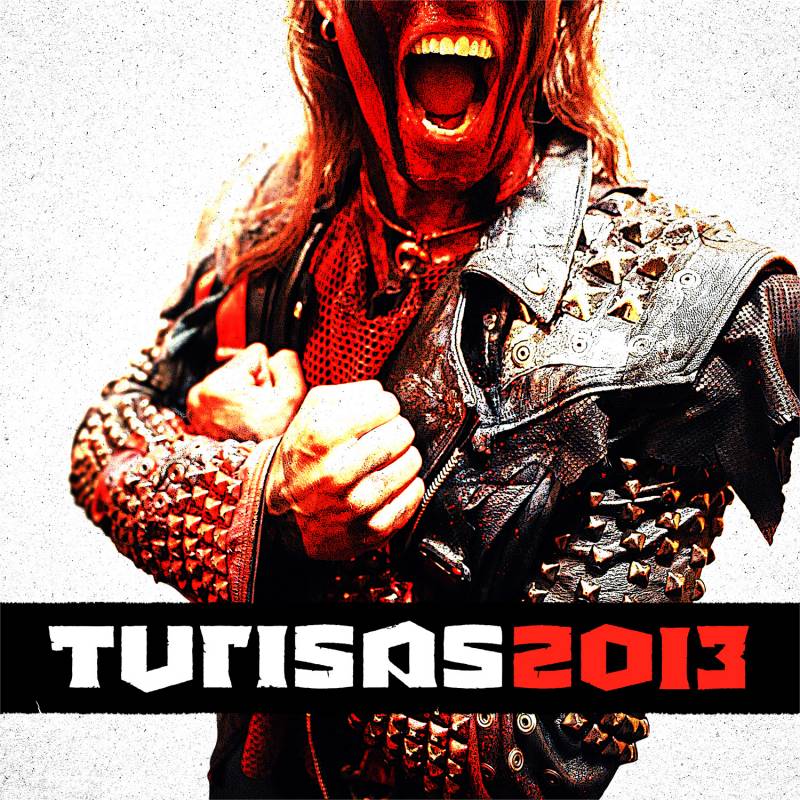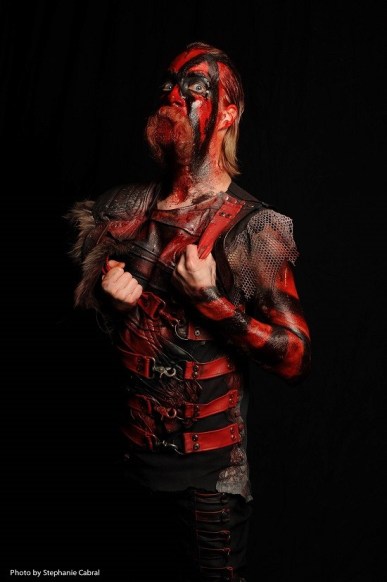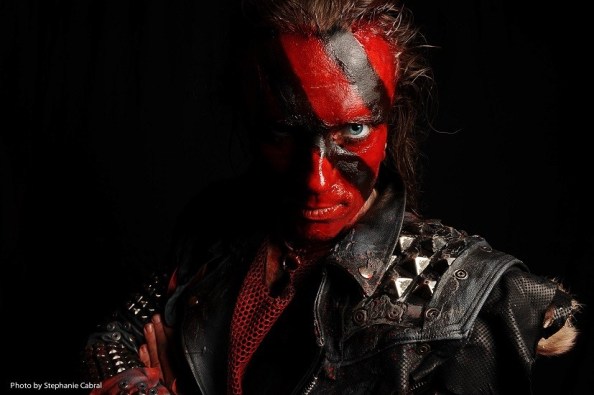Few would question the fact that folk metal is doing pretty well right now. Not only are there a lot of bands to choose from, catering to all tastes, but also a wide array of festivals and concerts happening all over the world and that are devoted to, precisely, this type of music. Whether you are into medieval, celtic, viking or oriental music, there’s something for you.
Within this genre (always hard to define because of the many influences and sounds that converge in it) Turisas occupy an enviable place, being arguably one of the oldest and most popular bands. This is the result of amazing visuals and an always evolving sound that has allowed them to stay relevant for over 15 years.
As part of our coverage of the amazing Hellfest 2014, we met with Mathias Nygård (vocals) and Jussi Wickström (guitars), who were happy to share some reflections on Turisas 2013 and, of course, the past, present and future of the band.
Metal Blast: It has been about a year since the release of Turisas 2013, and although it was well received overall, there were some criticisms saying that you were changing and simplifying your sound too much. In retrospect, how do you feel the reaction was?
Mathias: I think that it was pretty much along the lines of what we expected; we knew that the album wasn’t the same as what we had done before. With every album we’ve gone through the same thing, and there have always been some with a more “conservative” mind that enjoy the previous albums better. For us it has always been important to make the music that feels interesting to us; nowadays it would be easy to rest on our laurels, since we’re a professional band, and just do what people expect us to do so that we can pay our rent, but at the end of the day we have to make music that we love.

MB: Considering the role that Turisas plays in folk metal, do you feel that there’s always a big risk of people not wanting to accept change?
Mathias: Absolutely; from a career or success perspective, definitely. We started the band because we didn’t want to sound like the stuff that existed at that time, and that’s probably one of the keys to our early success. We’ve always wanted to stay true to that idea and that mentality, even if it means that there will always be fans who’ll love us for the first couple of albums and who don’t like the later material; at the same time, there are also people who have found the band thanks to those later albums, and for whom those as the most important ones. Success and fame are great, but they’re secondary to us being happy with what we do. We’re not a business that is being run to make a profit, we are a band.
MB: How do you manage to balance the business part, being able to eat and pay rent, with maintaining this idea of just being happy with your output?
Jussi Wickström: We’ve been doing this for so long that maybe the business parts affects us on an unconscious level; we know that we do this as a profession, but I think that we’re still doing this because we want to be in this band, not because we need to make money. If we wanted to make money I’d probably be a plumber and make more money than by being on this band.

MB: In Turisas 2013 I noticed that the “folk” elements did not come only from Scandinavia and Finland, but also from Eastern Europe. How did you get to that type of sound?
Matias: There has always been an interest in combining elements that are not so common. In The Varangian Way, for example, we had some elements that were of a more Eastern European vibe, and I think it’s nice to try to be a bit more creative. You can get pretty far by just doing some pseudo-Celtic melodies and putting some guitars on top of it and calling it folk metal [laughs] but I like to dig a bit deeper and look if we can find some other influences. In The Varangian Way we dealt with those Eastern themes, so we were actively trying to get that vibe into our music, instead of just the happy Irish jig [laughs].
MB: When bands like Turisas, Eluveitie and Korpiklaani started, the landscape was more or less empty, whereas now anybody grabs a bagpipe and calls it folk metal. Do you think that there are too many bands that are just trying to pull off the pseudo Viking or Celt and get on the bandwagon of folk metal?
Mathias: There are more and more bands coming, some of which are really good, but most of them don’t really have very high standards; for me it would be interesting to see bands that are trying a bit harder and not just taking the easy way. The problem is that there are many bands that just aren’t so good; it’s not that I’m putting us on a pedestal or anything, but I’d like to see more bands that are not just trying to follow others.
When you start out you more or less start by imitating others (we were, for instance, inspired by Amorphis and Bal-Sagoth) but then you have to develop and show what you are about; I think that there are many bands that just haven’t taken that extra step. As we turn into one of the older bands in the scene, I hope to see more of the younger bands that might have been influenced by us, Ensiferum or Finntroll, and see what they can offer for themselves.
MB: What do you think sets Turisas apart from all these other bands?
Mathias: If you take our music apart you can tell that it’s a bit more complex. It’s not just about the technical difficulty (otherwise some weird proggy band would be the number one) but rather about the originality and creating something new; we’re not about creating something just because it’s popular or because our fans, the media or the record label expects us to do.
MB: The visuals of Turisas are clearly an important element. Can you imagine ever abandoning it or do you think that it’s essential to the band?
Jussi: I think that if we wanted to do a show without makeup, we wouldn’t do it under the Turisas name. I think that nowadays we are pretty much linked to the visual aspects as well as to the music. It would be weird for me to see the band play a show and do the same songs without the makeup.
Mathias: This is where you can see the line between the “commercial” and the “artistic” aspects. Even though we always thought that Turisas should never limit itself and that the band should be more about what we feel like doing, the visual aspect is one of the things that we now see would be very hard to back out of while still making it work. Perhaps we just have to accept the fact that this is what we built and that if we wanted to change it we would destroy it, which isn’t worth doing just for the sake of proving a point.

MB: In the end you do have to stick to the brand that you’ve created
Mathias: I guess so! [laughs]
Jussi: Although we say that there are no limits, there are still some “invisible” limits that we choose to stay inside of.
MB: And to conclude; what’s in the future for Turisas?
Mathias: We’ve been touring pretty heavily for the last year, so what we’re really looking forward to is that our calendar after this summer is completely empty. It’s the first time in many years that this happens; we’re just going to take some time off and take our time to build something from scratch. We don’t have any schedule for a new release, which is great since it means that we can take all the time in the world for whatever we do next, and not just rush it to keep the business going. It’s going to be good to be able to be creative at your own pace and not having that deadline looming behind you… even though a deadline can be a good “whip” sometimes. [laughs]

